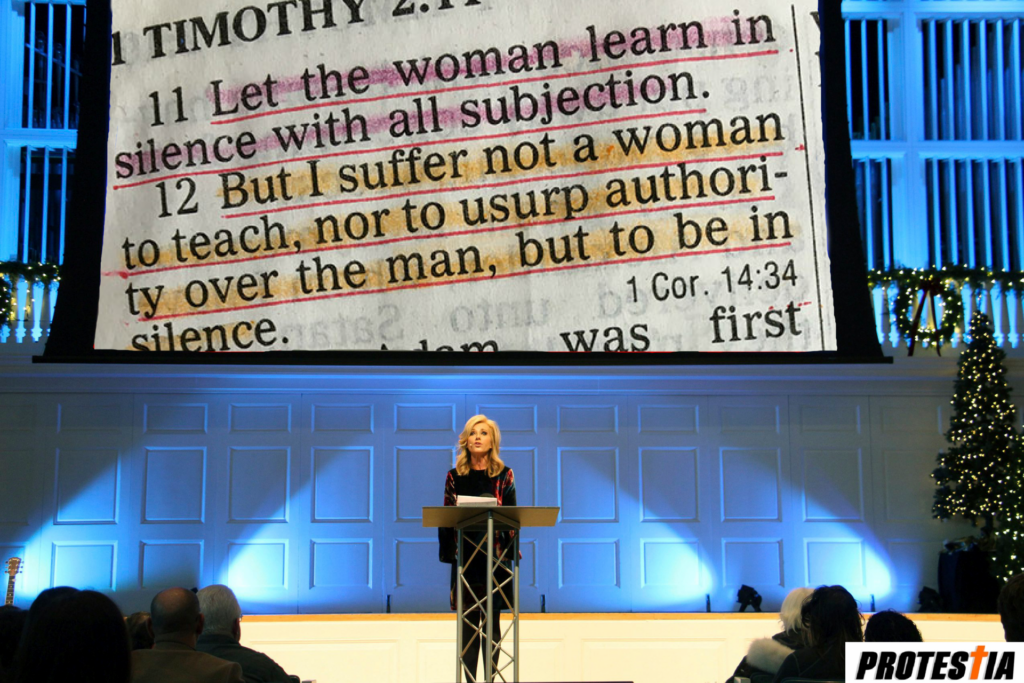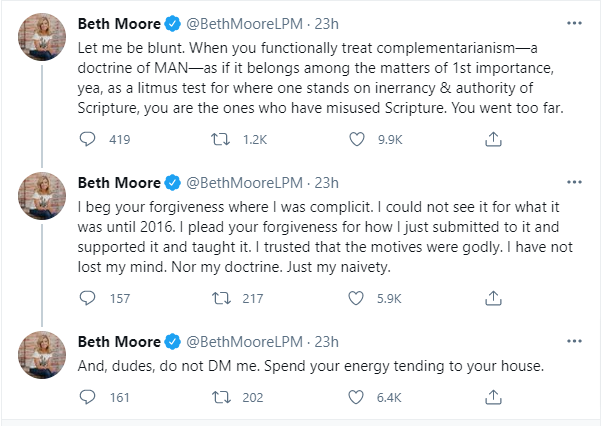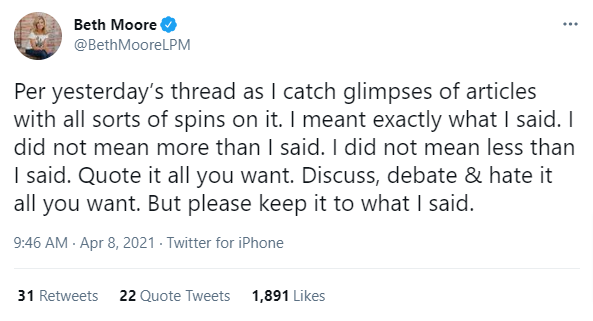Beth Moore Publicly Apologizes for Supporting Complementarianism, Calls it ‘Doctrine of Man’

It’s nice of her to finally come out and say it. Despite enduring abuse for years by critics for saying we were too hard on Beth Moore – that we were ascribing false beliefs to her when we kept on insisting she is an egalitarian who believes women ought to preach – and that we were slanderers for questioning her commitment to this biblical doctrine – the “VexUs from Texas” took to Twitter to announce that she does not consider different beliefs on women preaching to be an issue of biblical inerrancy and authority any longer, called complementarianism a “doctrine of man,” and apologized for elevating it to the position she had, begging for forgiveness.

This is not a surprise for us, as we have been calling our shots and documenting this since the beginning. For years she has been making comments on social media congratulating other women when she hears they are preaching, encouraging them to pursue the pulpit, and informing them that she’ll pray they deliver a holy-spirit empowered sermon. This is the most blatant and clearest comment yet on where her mind is with this, though even now she continues to pull her punches.
In a follow-up interview with RNS, Moore continued to hedge her bets for Russell Moore and men like him, giving them plausible deniability and a pathway to defend her by saying, to the question of whether she was egalitarian or complementarianism:
I’m not going to be pushed into either category right now because that’s not my point. My point is that it has taken on the importance of a first-tier doctrine.
Cue Russell Moore’s future retort: “Nowhere did Beth say she waaaaaaasn’t a complementarian, only that she doesn’t believe we should elevate it to the same importance as the doctrine of the Trinity. We can all agree on that, can’t we?”
She did likewise with a tweet this morning, admonishing people for reading into her tweet rather than reading it.

With this new revelation, Moore will continue her trend of telling us what she really believes, now that she is free of the restrictive shackles of the Southern Baptist Convention and the Baptist Faith and Message. What she’ll be saying publicly and unambiguously in the next two years is what she’s been saying coyly and piecemeal for the last ten.








So she says she was very wrong for years on what is obviously a key issue for her, but we should totally trust her now and let her preach. Check. Reminds me of Jory Micah (“Why won’t anyone let me preach?!?!?! Oh, by the way, I have now decided that God is worse than Hitler for sending people to Hell”).
Certain issues become a “litmus test” because those particular issues reveal a tendency to align with worldly philosophies rather than the Word of God, which is in opposition to those things. Homosexuality, marriage, gender and Critical Race Theory / Intersectionality are other blatantly obvious examples.
The Trinity isn’t one of those issues that people tend to either align with the world or align with Scripture on. The majority of the unbelieving world doesn’t even talk about it or care about it, and the current world isn’t pushing people towards a particular view on the Trinity where people can choose the world’s agenda or choose biblical Truth. That issue is therefore not a litmus test for alignment with the world, but is a litmus test for doctrinal integrity. Her biggest issue at the moment is her tendency to align herself ever-more closely with worldly philosophies as the years go by.
People chasing after approval of the world or promotion of self while denying Scriptural instruction in that process is the reason for much of the harsh criticism Beth Moore is experiencing. We have many examples of harsh criticism directed at such people throughout Scripture. Harsh criticism is also typically directed at those who promote heretical views. She appears to be poised to go farther down that road as well, so she should expect a few people to follow those biblical examples and direct some harsh criticism her way.
I always liked the phrase Alistair Begg uses to describe which doctrines are important “the main things and the plain things”. God’s teaching on male and female roles may not be a “main” thing like the Trinity, but it is very plain.
When it comes to complementarianism, Beth Moore is right for all the wrong reasons. It is a doctrine of man (specifically John Piper and Wayne Grudem) that tries to bridge the gap between Biblical teaching and the worlds teaching. It tries to blend the patriarchy and feminism and Beth Moore hates it because it’s not feminist and worldly enough. Being complementarian is the theological equivalent of wearing blue pants and a gray coat during the Civil War the problem is an entire side (conservative Christians) have been fooled into thinking that it will work while the other side (feminists) sees right through it.
A good resource to start would be to look up: “What is complementarianism?” at gotquestions dot org and then follow the whole of Biblical teaching on the subject.
Patriarchy is throughout Scripture, but it’s also not appropriate to ignore the multitudes of passages that point to the reason that God made us male and female. Incorporating scripture into our biblical worldview that addresses this issue is not by default a “doctrine of man”. If it follows scripture as a whole, it is a biblical doctrine.
Of course people can take it to an unbiblical place by putting things in that are not included in scripture, but that can happen in many areas. Just keep it legitimately biblical.
It’s heartbreaking to know that this blind guide holds a position of influence over so many naive and undiscerning women.
The problem that I have with complementarianism is not what it affirms but what it avoids. For example, complementarians will talk about how God has ordained differences between men and women which have meaningful differences in the church and home but refuse to apply those differences to society or politics. Also when it comes to men, complementarians have plenty to say about their responsibilities in the church and home, but very little to say about any kind of authority they have and when they do it’s always modified with terms like “servant”.